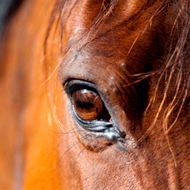Horse eye wrinkles indicate emotional state

Some horse owners use wrinkles as an indicator of uneasiness or discomfort.
May be a potential indicator of horse welfare
Eye wrinkles in horses can tell us about their emotional state and could be a potential indicator of horse welfare, according to a new study.
Horses display many facial expressions, but their eyes are particularly expressive due to the wrinkles above the eyeball.
Some horse owners use these wrinkles as an indicator of uneasiness or discomfort, while others refer to them as worry wrinkles or worry lines.
In the study, Sara Hintz from the University of Bern set out with her colleagues to see if there is a relationship between eye wrinkles and emotional states in horses.
The researchers induced different emotional states in horses and assessed whether situations presumed to be positive (anticipation of food or petting) would reduce the expression of eye wrinkles, or situations presumed negative (food competition and waving a plastic bag) would increase it.
During the experiment, a professional photographer captured images of both of the eyes in each of the horses during all four tests.
Through analysis of the number of wrinkles, the extent of wrinkling and how much white of the eye was shown, the researchers came to the conclusion that some characteristics of eye wrinkling were affected by different emotional states. However, they indicated that further research was needed.
The study took place at the Swiss National Stud Farm in Avenches, Switzerland using 16 horses, most of which were Franches-Montagnes stallions.
Sara Hintze was accompanied by Samantha Smith from the University of Edinburgh, Antonia Patt from the United States, Iris Bachmann from Switzerland and Hanno Wurbel, also from the University of Bern.



 The latest
The latest